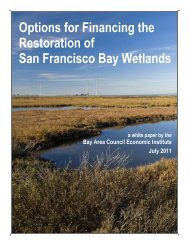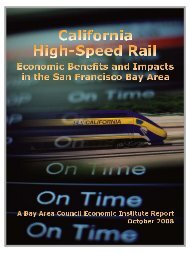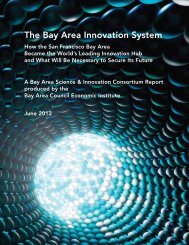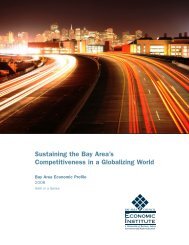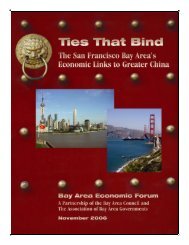PDF: 2962 pages, 5.2 MB - Bay Area Council Economic Institute
PDF: 2962 pages, 5.2 MB - Bay Area Council Economic Institute
PDF: 2962 pages, 5.2 MB - Bay Area Council Economic Institute
Create successful ePaper yourself
Turn your PDF publications into a flip-book with our unique Google optimized e-Paper software.
Global Reach<br />
Discussions between UC Berkeley and IIT-Kharagpur were initiated<br />
largely by IIT-Kharagpur alumnus Shailendra Kumar, senior<br />
director of external relations for the UC Berkeley College of Letters<br />
and Science. Kumar had earlier served as president of the IIT<br />
Foundation, an alumni fundraising entity for IIT-Kharagpur, and his<br />
efforts were a follow-up to the February 2007 India visit by UC<br />
president Robert Dynes and a systemwide UC faculty delegation.<br />
The collaboration was formalized in November 2007 with a return<br />
visit by three Berkeley deans—from Letters and Science, Physical<br />
and Mathematical Sciences, and Biological Sciences. Letters and<br />
Science dean Mark Richards and IIT-Kharagpur biotechnology<br />
department head Professor Satyahari Dey led the initiative at their<br />
respective schools.<br />
The model has been to focus on complementary research strengths<br />
and begin with small steps. The schools identified two areas of<br />
study—biofuels and health care biotech related to emerging or<br />
neglected diseases—and in 2008, hosted 11 IIT-Kharagpur students<br />
for an eight-week summer research session at Berkeley. The 2009<br />
summer session hosted 18 students.<br />
“It’s an experiment we’re conducting,” says current IIT Foundation<br />
president Roy DaSilva. “Our ultimate goal is to get a true collaboration<br />
going by bringing students over, having the professors here look at<br />
the quality of students available, and come up with projects that<br />
students and faculty at both schools can focus on.”<br />
Biofuels and health care biotech offer clear examples of <strong>Bay</strong> <strong>Area</strong>-<br />
India synergies, DaSilva explains. UC Berkeley, along with the<br />
Lawrence Berkeley National Laboratory and the University of<br />
Illinois, have formed the Energy Biosciences <strong>Institute</strong> (EBI) under a<br />
10-year, $500 million research grant from energy firm BP to develop<br />
next-generation fuels; IIT-Kharagpur has established a<br />
Biofuels Center of Excellence on its campus, and it is the only IIT<br />
with an agricultural engineering department. The study of nextgeneration<br />
fuels merges the developed world’s interest in energy<br />
independence and climate change with immediate, real world applications<br />
for India’s off-grid rural poor.<br />
Similarly, DaSilva points to the potential good that research into neglected<br />
diseases can do—and the potential market it represents in<br />
India and other developing countries. Some of that research can be<br />
difficult to undertake in the U.S., where the diseases in question may<br />
never have existed or have, in a different form, been eradicated.<br />
60



